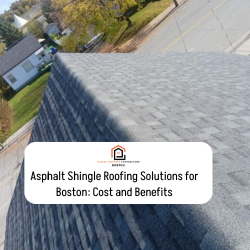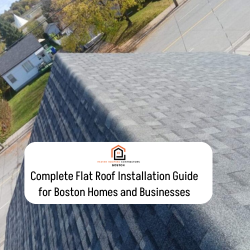Choosing the best roofing material for your home can be a daunting task, especially with the variety of options available today. The suitable roofing material enhances your home’s curb appeal and value and ensures durability and longevity. If you’re considering a roof replacement or building a new home, this guide will help you understand the different roofing materials available and which one might be the best choice for your needs.
Understanding Different Types of Roofing Materials
1. Asphalt Shingles
Before discussing the top 10 roofing materials, it’s essential to understand that they vary significantly in cost, durability, maintenance, and aesthetic appeal. Let’s explore the most popular roofing materials and their unique benefits.
Asphalt shingles are one of the most common roofing materials for residential roofs across the United States. They are cost-effective, easy to install, and provide adequate protection against the elements. Three types of asphalt shingles are 3-tab shingles, architectural shingles, and luxury shingles. Each type offers varying levels of durability and aesthetic appeal.
Benefits of Asphalt Shingles
- Cost-effective roofing material: Asphalt shingles are affordable and widely available.
- Variety of styles and colors: They come in a wide range of styles, allowing homeowners to choose a design that complements their home’s exterior.
- Easy to install and replace: Installing an asphalt shingle roof is straightforward, making it a popular choice among roofing contractors.
2.Metal Roofing
Metal roofs have gained popularity recently due to their durability and modern aesthetic appeal. Standing seam metal roofs are prevalent because of their clean lines and ability to run vertically along the roof.
Benefits of Metal Roofing
- Longevity: A metal roof can last anywhere from 30 to 50 years, depending on the material used.
- Durability: Metal roofing can withstand extreme weather conditions, making it an excellent option for areas prone to storms.
- Energy efficiency: Metal roofing reflects solar heat, helping reduce summer cooling costs.
3.Slate Roofs
Slate roofs are known for their natural beauty and durability. Made from natural slate tiles, these roofs can last over a century if properly maintained.
Benefits of Slate Roofs
- Aesthetic appeal: Slate tiles provide a timeless, classic look that enhances the value of your home.
- Longevity: A slate roof can last over 100 years, making it one of the most durable roofing options.
- Fire resistance: Slate is a natural stone and is inherently fire-resistant.
4.Tile Roofing
Tile roofs, especially clay tile roofs, are prevalent in regions with hot climates. They are known for their durability and distinctive appearance.
Benefits of Tile Roofing
- Durable material: Tile roofs can withstand harsh weather conditions and resist rot and insect damage.
- Energy efficiency: The thermal properties of tiles help in reducing cooling costs.
- Longevity: Tile roofs can last over 50 years if well-maintained.
5.Wood Roofing
Wood roofs, such as cedar shake roofs, are an excellent choice for homeowners looking for a natural and rustic appearance. Shake roofing is particularly popular for its rugged, textured look.
Benefits of Wood Roofing
- Natural insulation: Wood roofing provides excellent insulation, keeping your home warm in winter and cool in summer.
- Aesthetic appeal: Wood roofs offer a unique, natural look that adds charm to any home.
- Durability: Cedar and other types of wood can last up to 30 years with proper maintenance.
6.Synthetic Roofing
Synthetic roofing materials, like composite roofing, mimic the appearance of natural materials such as slate or wood but come at a fraction of the cost.
Benefits of Synthetic Roofing
- Cost-effective: Synthetic roofing is an affordable alternative to more expensive roofing materials like natural slate.
- Low maintenance: These materials require less maintenance than their natural counterparts.
- Versatility: Available in various styles and colors to suit different architectural designs.
7.Flat Roofing Materials
Flat roofs are commonly used in commercial buildings and residential properties. Membrane roofing, such as EPDM rubber roofing, is a common roofing material for flat roofs.
Benefits of Flat Roofing Materials
- Cost-effective: Flat roofs are generally less expensive to install and maintain.
- Ease of installation: Roofing materials for flat roofs are easier and quicker to install than pitched roofs.
- Space utilization: Flat roofs can be utilized as rooftop gardens or solar roof installations.
8.Green Roofs
Green roofs, also known as living roofs, are becoming increasingly popular for their environmental benefits. They consist of a waterproof membrane, a growing medium, and vegetation.
Benefits of Green Roofs
- Environmental impact: Green roofs help reduce urban heat islands and improve air quality.
- Energy efficiency: They provide natural insulation, reducing heating and cooling costs.
- Aesthetic appeal: Green roofs add a unique and natural element to urban and suburban environments.
9.Solar Roofing
Solar roofing materials, such as solar roof tiles, are a modern solution for reducing energy bills and carbon footprint. These tiles integrate seamlessly with your existing roof design.
Benefits of Solar Roofing
- Energy generation: Solar roofs help homeowners generate their own electricity, reducing utility bills.
- Environmentally friendly: Solar roofing is a sustainable option that reduces greenhouse gas emissions.
- Innovative design: Solar roof tiles are designed to blend with various roofing materials, providing a sleek, modern look.
10.Rolled Roofing
Rolled roofing is a cost-effective and quick-to-install option primarily used for low-slope residential roofs or additions like sheds.
Benefits of Rolled Roofing
- Affordable roofing: Rolled roofing is one of the most affordable roofing materials available.
- Quick installation: It is easy to install, making it a popular choice for smaller projects.
- Lightweight: Rolled roofing is lightweight, reducing the structural load on the building.
Choosing the Best Roofing Material for Your Home
When selecting the best type of roof for your home, consider factors like climate, budget, maintenance needs, and aesthetic preferences. Roofing contractor Boston are well-versed in local weather conditions and can help you find the right roofing material. Whether you opt for the classic look of slate tiles, the durability of a metal roof, or the eco-friendly appeal of a green roof, the right choice will keep your home safe and enhance its value for years to come.
For those in Boston looking for reliable roofing services, working with experienced roofing contractors familiar with the National Roofing Contractors Association guidelines is crucial for a successful roofing project. Investing in the suitable roofing material is not just about aesthetics; it’s about making a wise home improvement choice that will pay off in the long run.



